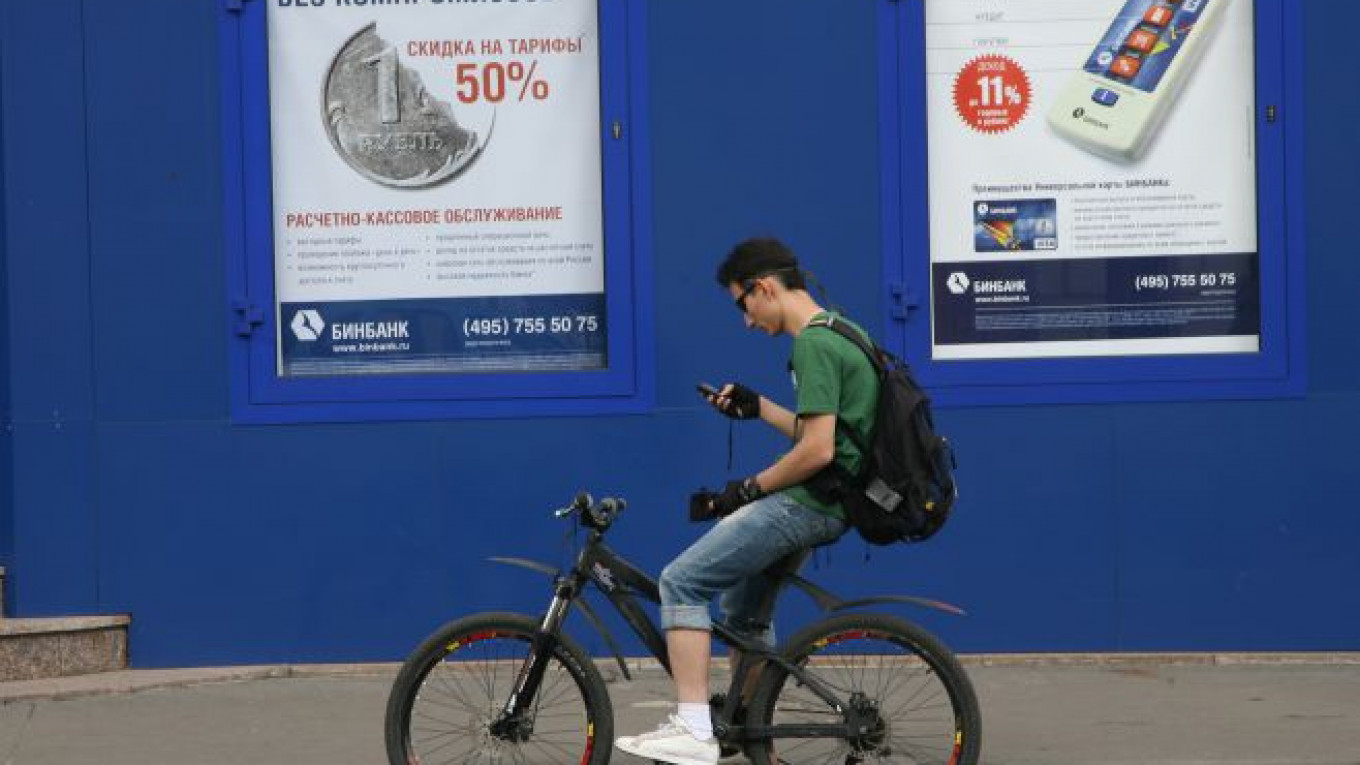Russia's economic crisis is causing an increase in mergers and acquisitions in the banking sector as a capital squeeze and increase in bad loans leave smaller lenders weak and vulnerable to takeovers.
But buyers tempted to swallow up rivals risk exposing themselves to heavy losses at a time when access to Western capital markets is closed by sanctions over the Ukraine crisis and tight Central Bank monetary policy means costs are higher.
"The very real danger is that the banking sector may face even tougher times before this crisis gives way to recovery," said Chris Weafer, senior partner at Macro Advisory consultancy in Moscow.
"I expect to see many midsize banks forced into rescue mergers with stronger banks before this crisis ends."
There has been a flurry of M&A activity by banks in Russia's top 100 by assets in recent weeks as weaker lenders seek investment and stronger banks go hunting to increase market share.
Shareholders in B&N Bank, one of the top 20 in Russia, said last week they were buying a controlling stake in rival MDM Bank, while the owner of Credit Bank of Moscow is looking at buying a majority stake in UralSib.
Vozrozhdenie Bank is also discussing a merger with Absolut Bank, and Promsvyazbank has said it plans to grow by acquisitions.
Each is taking a gamble in the current economic climate, following the ruble's sharp depreciation last year and a collapse in global oil prices.
"The key risk for buyers is how much capital they need to inject to prop up their weaker targets. The big unknown for them is the asset quality of the banks they are buying," said Yaroslav Sovgyra at Moody's credit rating agency in Moscow.
Alex Kantarovich, head of CEEMEA equity research at J.P. Morgan, said: "M&A always carry an execution and asset quality risk, and we have seen such risks crystallizing for some of the acquirers."
Likely targets for prospective buyers are weaker banks in need of capital or those with good fundamentals that are attractive because of depressed prices.
Boom to Bust?
Central Bank data show banking sector assets fell by around 7 percent from the start of the year to June 1 as loan books shrank, while the share of overdue loans rose to 5.8 percent for corporate lending and 7.4 percent for retail.
President Vladimir Putin wants banks to keep lending to help the economy and said last month the government should consider new support measures, in addition to a 1 trillion ruble ($17.5 billion) capital boost agreed late last year.
The Central Bank pushed its key interest rate up to 17 percent in December to halt the dramatic slide of the ruble, which has since steadied. The lending rate remains high, even though the bank has since reduced it to 11.5 percent.
Russia has around 750 functioning banks, down from 900 when Elvira Nabiullina became head of the Central Bank in June 2013 and launched a cleanup of the sector.
Analysts have long said that is too many, and the head of Russia's second-largest bank VTB said in a recent interview he thought as many as 500 could leave the market over the next five years.
Olga Naidenova, a banking analyst at BCS brokerage in Moscow, said the likelihood of new M&A deals in the banking sector was "very high."
Midsize banks have been the most active in snapping up rivals, including via Central Bank-initiated bailouts, which have increased as economic conditions have worsened.
Otkritie took control of Trust Bank under such circumstances after it was bailed out late last year. B&N Bank took over a series of smaller banks as part of other bailout proceedings in 2014.
Top state bank Sberbank has distanced itself from M&A activity and VTB is still in the process of integrating rescued lender Bank of Moscow.
Both would have little to gain from new purchases since they already dominate the Russian market.
With bailouts, there is the risk that more money is required than first estimated, but the Central Bank provides funds to the bank doing the restructuring. For traditional M&A, however, buyers are on their own if they face large unforeseen costs.
The economic crisis means that risk is greater at present, prompting Naidenova to caution: "The synergies could turn out to be less than anticipated."
A Message from The Moscow Times:
Dear readers,
We are facing unprecedented challenges. Russia's Prosecutor General's Office has designated The Moscow Times as an "undesirable" organization, criminalizing our work and putting our staff at risk of prosecution. This follows our earlier unjust labeling as a "foreign agent."
These actions are direct attempts to silence independent journalism in Russia. The authorities claim our work "discredits the decisions of the Russian leadership." We see things differently: we strive to provide accurate, unbiased reporting on Russia.
We, the journalists of The Moscow Times, refuse to be silenced. But to continue our work, we need your help.
Your support, no matter how small, makes a world of difference. If you can, please support us monthly starting from just $2. It's quick to set up, and every contribution makes a significant impact.
By supporting The Moscow Times, you're defending open, independent journalism in the face of repression. Thank you for standing with us.
Remind me later.






